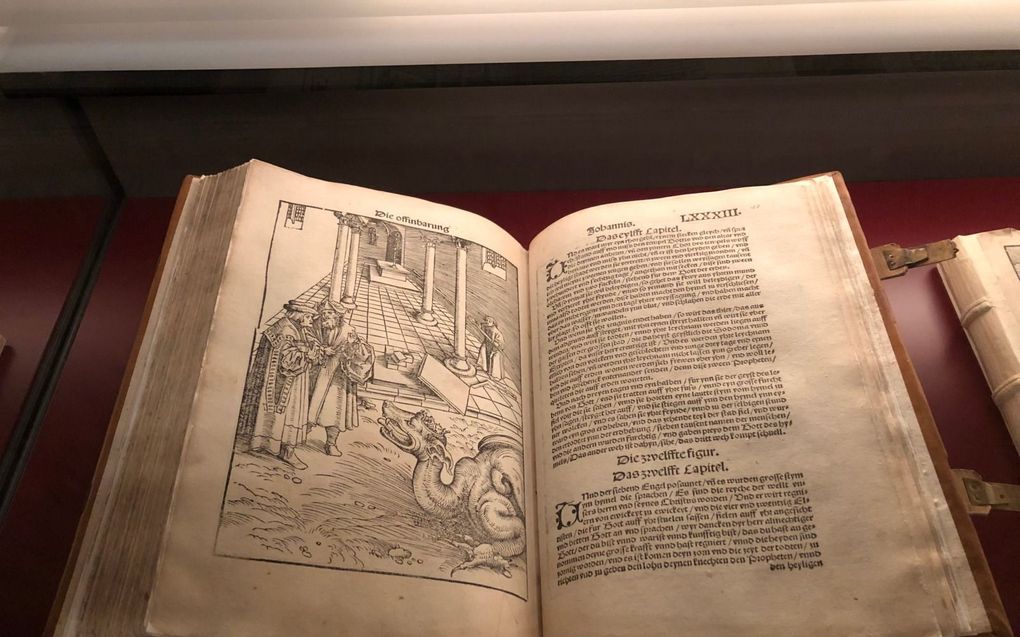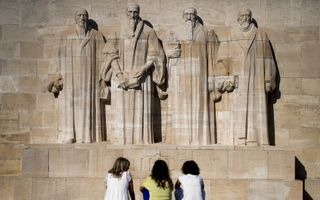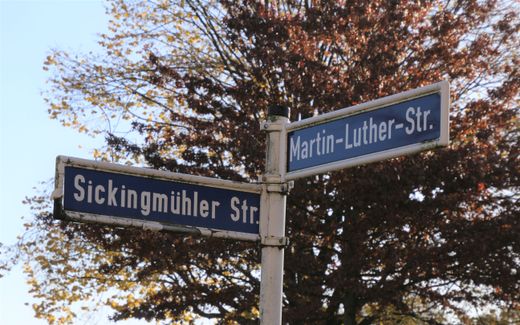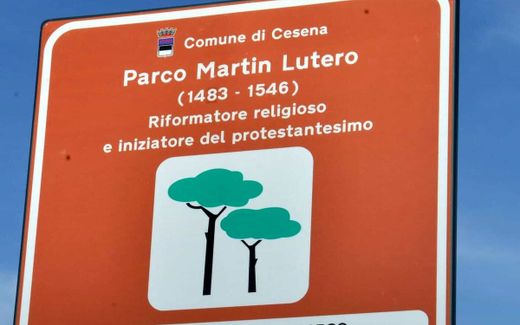500 years ago, Luther brought the world the Book it was waiting for
25-06-2022
Central Europe
Geerten Moerkerken, RD

The December Testament. Photo RD
Central Europe
With his "Germanisation" of the Bible, Martin Luther opened the doors to God's Word for the common man 500 years ago. "They should be able to read the Bible as if it had been written yesterday." Luther's life work originated at the Wartburg Castle. He worked hard there, but he probably never threw ink as the story goes.
Justification
This article traces the origin of the Luther Bible from Luther's first work of translation to his death. The italicised quotations are based on letters and works of the Reformer. The dating of the quotes points to milestones in the development of the Luther Bible. This does not mean that all the texts were written on those dates; often, different statements on the same themes have been combined into one whole. Most of the quotations can be found in "Luther and the Bible" (1961) by Luther expert W. J. Kooiman.
29 March 1521
"They expect me in Worms. Before the Emperor even. I am afraid I will not meet many friends there. I know that my name has a bad ring to it. But it is not about me. I am willing to resign if I have to, as long as the truth of the Gospel does not have to resign. They can have everything from me as long as they keep the way of salvation open for the Christian. Martin Luther may die, but Christ must live.
That is not stubbornness; I cannot help it. It is as if God has put blinders on me and put me on a racecourse, like a horse that has to run a race. I can only go one way, even if they all ask me to recant. I was born to combat sects and devils, and that is why my books are so tempestuous and full of fighting spirit.

As long as my conscience is captive to the Word of God, I cannot and will not recant anything. Everything becomes uncertain, and salvation is at stake if you do something against your conscience. God help me!"
Slowly but surely, the monk Martin Luther discovered a freedom about which he could no longer remain silent. He found the answer to his life's questions in the Bible: in salvation through faith in Jesus alone, without his own works.
He began to spread this message more and more. That he thereby also wiped the floor with many traditions of the Roman Catholic Church did not go down well with the Church. The conflict got so out of hand that in 1521 the Emperor summoned the Reformer to the Imperial Diet in Worms to give an account of his "new doctrine”.
Luther knew that going to Worms could cost him much, even his life. But he also knew why he had no choice but to go: he had found his teachings in God's Word, and because of that, he feels bound: trapped in his conscience.
His discovery of that Word also led him to an unprecedented undertaking: translating the Bible into the vernacular. The history of Luther's lifework begins in 1521, the year of the Reichstag.
12 May 1521
"Dear Philipp,
How are you? Last week, on my way back from Worms, I was kidnapped to the Wartburg. Will you pray for me that my disappearance - which I reluctantly agreed to - may be to the glory of God? I am concerned that people think I have fled the battle. But I could not convince those who urged me to go into hiding. I have no greater desire than to face the fury of my enemies and offer them my neck.

Castle life suits me poorly. Especially my bowel movements are hindering me again. But I am glad I can finally work in peace: I am learning Hebrew and Greek and can write without interruption.
Hang in there and stand firm as a servant of the Word, Melanchthon, because, after me, they will go after you too. A warm greeting from the kingdom of birds!"
Things are not going well in Worms. The Imperial Diet did not understand Luther's views; on the contrary, the Emperor declared him an outlaw heretic. This put Luther's life in danger. Friends staged a kidnapping on the return journey from Worms to his hometown Wittenberg and brought him to Wartburg Castle near Eisenach. He lived there incognito for almost a year.
The stay was hard for him. After initial feelings of uselessness, he became very productive but still felt displaced. "My Patmos", he calls his place of exile, "the kingdom of birds, the desert".
January 1522
"In the meantime, I will start translating the Bible here, although I see that I have loaded a burden on me that is beyond my strength. Now I understand what it means to translate the Bible and why those who have done so until now have not had their work published under their own names. I would like to start with Genesis, but I am not ready to tackle the Old Testament. I hope we can soon give our people a Bible in German that they can read."

Today, the Wartburg is a castle as a castle should be: with a drawbridge, impressive tower, and walled courtyard. It is no surprise that the castle has reached the UNESCO's World Heritage List. However, Luther himself saw very little of the castle's splendour: most of it dates from the 19th century.
The Reformer spent his exile in a much simpler castle. There, he developed the idea of translating the Bible into German. A wish that he had for some time, but now suddenly, there was that ever-missing factor: time, in abundance.
The only thing that was not yet at peace is that reports are reaching him from Wittenberg. "Prophets" - radical reformers - are spreading unrest in Luther's absence. In December 1521, he paid a lightning visit to his hometown to check up on the situation. The situation reassured him for the time, but his visit yielded something else. When he met his friends in Wittenberg and told them about his translation plans, they urged him to take up the work. Back at the Wartburg, he put his money where his mouth was and began translating the New Testament.
1 February 1522
"The devil visited me today with his wiles, but I drove him away with ink.
A challenged Luther is throwing an inkwell against the wall to chase away the devil: the story resounded on many Reformation days. But it is legendary rather than having historical solid papers. The ink was probably never thrown, although a stain on the wall of the Lutherstube -Luther's room at the Wartburg- was faithfully repainted with new ink for years because all kinds of visitors were touching it with their fingers. By the way, Luther's writing desk in the same room fared similarly: after pilgrims took a piece of the furniture home with them, so little remained of it that a replica is now on display - now safely behind a cord, moreover.

So what does the Reformer mean? He was certainly challenged, and Luther experienced the devil at the Wartburg in many different ways. The only way to chase away God's opponent, he knew, was with ink: the written Word of God. The fact that he experienced demonic attacks during the translation of the Bible was not strange to him. When the weapon of the Word becomes available to ordinary Christians, hell is bound to rise, Luther believes.
15 March 1522
"Fortunately, I am back in Wittenberg. It took some sermons to restore peace in the city. Now Melanchthon and I, together with others, have begun polishing my translation of the New Testament. I benefit greatly from the insights of my friends. Translators should never work alone. When someone is alone, he does not always find the right and appropriate words. However, Philipp is sometimes too careful with his translation work. I want to express things as clearly as possible. God willing, it will be a worthy work.

Luther speedily completed his translation of the New Testament at the Wartburg. He only needed eleven weeks for it - from December 1521 to the beginning of March 1522.
However, the troublemakers in Wittenberg were not sitting still either, and in March, Luther was forced to return from the Wartburg for good. He put the city in order with a series of sermons. His translation was his second priority. He discussed his manuscript thoroughly and critically with his colleague Philipp Melanchthon (1497-1560), a humanist and linguist.
Luther was not the first to translate the Bible into German. There are at least eighteen German Bibles from before Luther's time, the last of which - the Halberstädter Bibel - also saw the light in 1522, shortly before Luther's New Testament was published.
What was new was that Luther wanted to start from the fundamental languages and thus translate directly from Hebrew and Greek. Until then, the Latin Vulgate was the starting point for translations and the only Bible permitted by the Church. But too many errors crept into it, the Reformer argued. Gratefully he made use of Erasmus's edition of the Greek New Testament.
The question is to what extent Luther really relied on the fundamental languages in his translations or whether he still relied heavily on the Latin Bible," explains theologian and city guide Oliver Friedrich when he shows the Melanchthon House in Wittenberg, where Melanchthon once lived and worked, in May 2022. "Luther's knowledge of the fundamental languages was limited, and he knew it himself. Melanchthon had a much better command of Greek. You could say that Melanchthon was the real 'star' of the Luther Bible. In any case, the work was done as a team."
Translating has a lot of difficulties, the Wittenberg theologians discovered. Luther sent a letter to Spalatinus, the Elector's secretary, with a list of animal names. Luther asked him what kind of animals they were. In the case of Leviticus 11:30, the Reformer decided on a hedgehog because the Hebrew root word -anaqah- reminded him of the sound a hedgehog makes. Nowadays, researchers suspect that this animal was a gecko.
25 September 1522
"Today, I was able to send the first edition of my New Testament to the Wartburg. May God bless this work. For the light of His Spirit is necessary to understand the Scriptures, for no one can see an iota in the Scriptures if he does not have the Spirit of God.
Take humanists like Erasmus: they translate Paul well but do not understand him well. The wicked can explain the Scriptures, but the real-life, the lesson of experience, God's finger writes into our hearts by grace. He wants us to come to know Christ in the Spirit through the Scriptures. How does He do that? Then He casts us into poverty, humiliation, shame, hunger, thirst and distress of conscience. Then His Word becomes precious!

The soul can lack everything except the Word of God, and without the Word of God, it cannot be helped. But if the soul has the Word, he needs nothing else; the Word is enough for him. What the pasture is for the cattle, the nest for the bird, the river for the fish - that is the Scripture for the believing soul."
In September 1522, Luther's New Testament came off the presses in the Wittenberg printing house of Melchior Lotter (1490-1542). The well-known townsman and painter Lucas Cranach (1472-1553) served as publisher and lender.
The work has become known as the September Testament and probably appeared in an edition of some 3000 copies. The demand was so great that a few months later, a second edition already saw the light: the December Testament.
September 1524
"This month, the book of Psalms could be published. I must honestly admit that I overestimated myself when I conceived the plan to Germanise the Old Testament. We know so little of Hebrew.
It is a hard and difficult job to force those writers to speak German against their will. They have no desire to give up their Hebrew and imitate the barbaric German. It is like forcing a nightingale to imitate a cuckoo and give up its own delightful melody for the monotonous cuckoo song it must hate.

Take Job; it seems that he endures our translation even worse than the consolation of his friends. Or perhaps he wants to sit quietly in his ashes; it seems to me that the author of this book certainly did not wish it ever to be translated into another language."
As quickly as Luther translated the New Testament -in eleven weeks- he needed just the same amount of time to complete the Old Testament: about twelve years. There were many challenges. In addition to the complicated Hebrew - of which knowledge was limited at the time - numerous current problems demand Luther's attention.
It means that the Old Testament appeared in parts. Luther paid particular attention to the translation of the psalms, which were very important to him. Even before the first complete Luther Bible came off the press, a revised edition of the psalms was published.
12 September 1530
"I may have made mistakes in my translation of the Bible. In any case, I do not accept the Papists as judges, for they have too long ears, and their "Ja, ija" sounds too weak to judge my translations properly.
I have always known that you are more likely to find ten thousand know-it-all donkeys than one who imitates me by even a twentieth part. If anyone is so much wiser than I am, let him go and translate the whole Bible into German, and when he has finished, come back and tell me how clever he is. Why should his translation not be preferred to mine if his is better?

A translator must not be a prisoner of the text. People must be able to read God's Word as if it were written yesterday. One must not ask the Latin letters how to speak German - that is how the donkeys do it - but one must ask the housemother, the children in the street and the common man in the market; one must hang on their lips to hear how they speak and translate into their language. Then they will understand and notice that you are speaking German to them.
If someone wants to speak German well, he should not cling frantically to the Hebrew expressions, but when he has understood the Hebrew text, he should ask: Would a German speak like this in this case? And when he has found the German expression, he may let go of the Hebrew words and express the meaning in the best German he has.
Yet I did not stray too far from the literal text, but I took great care to stick to the letter when it came down to it and did not translate so freely. Then I preferred to harm the German language rather than deviate from the word-for-word content."
Luther's Bible did not only gain tremendous popularity in a short time but also faced a storm of criticism. Roman Catholic theologians watched with dismay as the German translation gained ground. They criticised Luther's free, folksy style, which lacked the exaltation of the Vulgate, and claimed that the Reformer had also translated his theological vision into the text.
Luther's translation of Romans 3:28, in which he added the word "allein" (translated as ‘only’ in English), was particularly criticised. Thus, the text writes that man is justified without works, by faith alone. This last Word is missing from the original text, and Luther would therefore have done violence to the Word.
In 1530 the Reformer reacted sharply to the criticism in a letter about translation, the "Sendbrief vom Dolmetschen". Although Paul did not write down the Word alone, Luther believed that he meant it that way and that it was necessary to write it in order to make it clear that all human works were excluded. "Actually, I regret that I did not also add the word 'all' twice: without all the works of all the laws, just so it is clear."
What is striking is that the Wittenberg theologian gives a substantive reason for translating the text in this way. In short, two rules are evident in Luther's translation work. Firstly, the text should be "obscured" as much as possible. Although he held the original text in high esteem, Luther took liberties with it. For example, choosing a similar German proverb that better conveyed the meaning of a text. Or by converting currencies to German amounts so that everyone could understand how much money was involved. The dignitaries in the Bible are called mayor or chancellor because Germans are familiar with these functions.
Secondly, a theological motive is leading: the message of the text, especially of the cross of Christ, must shine through clearly. This principle is so important that Luther sometimes deviates from his first rule for this very reason. For example, he would leave a Hebraism - a typical Hebrew expression - as literal as possible because otherwise, the intention would not come through as clearly. Thus, according to Luther, Psalm 68:19 should actually read, in good German, "Thou hast redeemed the captives." However, he chooses the more literal translation "Thou hast taken captive" because "captive" here, according to Luther, refers to the Law, sin and death: the spiritual dungeons from which Christ redeems.
24 January 1534
"We are putting the finishing touches to the complete Bible. I think that we now have a reliable and clear edition. Certainly, if the printers do not - as is their custom - spoil the book with their laziness, the German language now certainly has a better Bible than the Latin.
After we received from the merciful God in His unspeakable grace the privilege to transcribe the Bible into German as clearly and purely as possible, at the expense of which we have done a great deal of work, avarice has attacked our printers. So that we do the work and bear the expenses, while others make the profits. As for me, I have received nothing for it, nor do I desire anything for it. Christ, my Lord, has repaid me hundreds of thousands of times."

Luther did not get rich from his translation work. On the contrary, he did not earn a penny from it. The community around the Reformer lived in financial need most of the time, says city guide Friedrich as he showed them the garden of the Wittenberg Luther House.
Others, however, earned handsomely from the publication. The rise of the printing press contributed greatly to the rapid spread of the Luther Bible. Printing was labour-intensive because every letter had to be set by hand. The Bible was published far beyond Wittenberg, and, much to Luther's chagrin, serious printing errors often accompanied it.
6 August 1534
"At last, the time has come: today we have received the printing privilege from the Elector to publish the complete Bible, what a lot of work lies behind us. I have made a great effort to give pure and clear German. It has happened to us that we have searched for a specific word for a fortnight, three or four weeks, and asked others about it without being able to find it. But now it has been Germanised; everyone can read it and has mastered it just like that. Now someone lets his eyes fly over three, four pages without bumping into anything. He doesn't even notice the potholes and bumps anymore. Where he now glides over, as if over a polished board, we had to sweat and toil to clear the holes and bumps out of the way so that one could now walk there so nicely.

And now: go to the Scriptures, dear Christians, go to them! And let my explanations and those of all other teachers be no different than a scaffolding around the building itself, that we may grasp the simple, pure Word of God, that we may appropriate it and hold it, for only here in Zion does God dwell."
Twelve years after the publication of the September Testament, the complete Luther Bible -including several apocryphal books- saw the light of day by the printer Hans Lufft (1495-1584). Each book of the Bible opens with a decorated initial, and the edition has 124 illustrations. The Bible has a distribution on a scale - certainly for that time - unprecedented. By 1534 Luther's New Testament had already found its way beyond the country's borders. It is estimated that half a million Bibles and Bible passages were distributed during Luther's lifetime. The Dutch Lutheran scholar W. J. Kooiman once wrote that it was "the book the world was waiting for".
The translation thus has had great significance for the spread of the Reformation, but not only that. Because the Bible is so widely spread, it played a significant role in transcending the various regional dialects and thus also shaped the German language. The famous German poet Goethe once wrote: "The Germans are one people made by Luther."
July 1540
"With our colleagues, we are working on a revision of the Bible. Today we are discussing 1 Kings 5:15. I would like to see where the 80,000 and 70,000 carpenters with their axes came from. It would be a miracle if there were that many axes in the land. It is a wonderful story. I strongly believe that the Jews have corrupted it. Are 200,000 men perhaps 2,000? I wish I had finished this book. I find the building of Solomon's Temple extremely unpleasant.
Christ is certainly present in the Old Testament but not as clearly as in the New. When Moses speaks of Christ, I listen to him, but I have nothing else to do with him! The Gospel is hidden in the Law, and it is not seen, just as the streams of water are hidden in the rock. Until you strike it with the wood of the cross, then the stone cracks, and the water bubbles out."
The Luther Bible is never finished but constantly evolving. During Luther's lifetime, he worked on revisions, and after 1534 two more revisions of the complete Bible came off the press. Many of the revision meetings have been extensively documented, and Luther's free handling of both the text and the books is striking. This is not to say that he did not hold the original Bible text in high esteem, as is evident from the extensive and careful discussions about the correct translations.
However, this freedom has everything to do with Luther's view of the Bible, which must, above all, point to Christ. A text must "treiben" Christ: drive the reader to Christ like a shepherd drives his sheep. Where that is lacking, the Reformer does not hesitate to downgrade parts of the Bible. For example, in Leviticus, Esther, James and Revelation, he misses this notion too much. Regarding Old Testament books, Luther's outspoken and fierce anti-Jewish convictions regularly resound in his appreciation.
Such books do have their place in the Bible, but they are not "Hauptbücher", the main books in which the cross doctrine clearly emerges. According to the Reformers, this is to be found in Paul or in the Gospel of John, for example.
23 January 1546
"Today, I instructed the printer to publish the Bible in large letters for the visually impaired. Whether I will see the result, I do not know. I can't do it anymore; I'm finished. May God grant me a good, blissful end.

Our standard is the Word of the Cross, the triumphant sign stained red with the blood of Christ. With this, the Church of Christ, which alone is stronger than a whole army with many banners, faces all the powers of darkness. For to set aside the Word and to want to fight without the Word is not much different from playing a game, as children do during their holidays.
And yet, after all these years, I must admit that I do not even know the ABCs of that Word. Day and night, I have been busy with the Bible, and yet I am still a primary school pupil.
We are beggars, that is true.”
Luther's words about the beggar have been much quoted as a summary of his doctrine of grace: man as a beggar before God. No doubt the Reformer would have agreed with this, but he wrote down the words just before his death on 18 February 1546 in a different context: the interpretation of the Bible. When it comes to understanding the Bible, even the most significant theologian remains a beggar, dependent on God's light.
What Luther found in that Word, others must also discover. More than his theses, sermons and books, the Luther Bible brought God's Word close to people. Five centuries after his translation work, its effects are still visible, like in a Wittenberg hotel room, where the Luther Bible sits on the bedside table. It is no longer the same version as 500 years ago, although it took a long time before people dared to work on a revision of Luther's work.
If you open the Bible at random, a few texts in bold print immediately catch your eye. Such as Psalm 56:5: "Ich will Gottes Wort rühmen; auf Gott will ich hoffen und mich nicht fürchten; was sollte mir Fleisch tun?" (Translated as: In God (I will praise His word), in God I have put my trust; I will not fear).
Luther himself suggested highlighting essential texts in this way in the text. Whether he needed it is questionable: the Reformer was known for his phenomenal knowledge of the Bible, and he knew many texts by heart. But he knew: in this way, they are within reach, loud and clear, for the challenged Christian who seeks comfort and stability in the Word.
Related Articles






